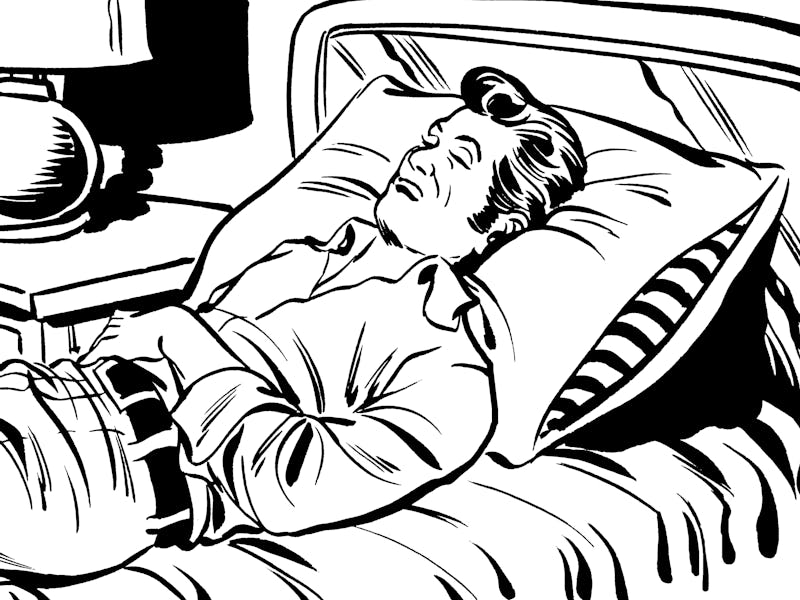Sleep study reveals a surprising link between insomnia and entrepreneurship
And it could explain how Elon Musk rose to the top.

What do famous entrepreneurs including Bill Gates and Elon Musk have in common (besides lots of money in the bank)?
Poor sleeping habits.
Musk is perhaps the most famous of the chief sleep-deprived officers, telling The New York Times in 2018 that “it is often a choice of no sleep or Ambien.”
But a new study out of University of Central Florida and published in the journal Entrepreneurship Theory and Practice suggests these famous entrepreneurs may have always had issues sleeping. It was these ADHD-like tendencies that drove them to entrepreneurial behavior, helping them to launch their companies. But that’s not to say that people shouldn’t sleep.
“We’re not advocating depriving yourself of sleep to get ahead,” Jeff Gish, a professor of business at the University of Central Florida and co-author of the paper, said in a press release about the study. “We’re saying that there appears to be an interesting link between sleep and entrepreneurship. ADHD-like tendencies can be a benefit, rather than a hindrance in spurring ventures.”
The researchers found this connection between poor sleep and entrepreneurship after conducting four studies involving more than 800 people. In the first study, 350 participants filled out surveys about their sleep and ADHD tendencies from the past six months. These were the questions:
- How well did you sleep last night?
- How soundly did you sleep last night?
- To what extent did you experience the following symptoms last night?
- Had trouble falling asleep
- Had trouble staying asleep (including waking up too early)
- Woke up several times throughout the night
- Woke up after your usual amount of sleep feeling tired and worn out
- Please fill in the times for each of the following events.
- What time did you go to bed last night?
- After going to bed, how many minutes did it take for you to fall asleep?
- After initially falling asleep, how many minutes did you spend awake?
- What time did you finally wake this morning?
After answering the questions around sleep, participants were asked about their intentions to start or acquire a business in the next five to 10 years. This group was then split into two: one had an uninterrupted night of sleep and woke up the next day to fill out a survey about sleep quality, ADHD-like tendencies, and intent to start a new business, while the other filled out a total of 10 surveys beginning at 10 p.m. one night and every hour on the hour until 7 a.m. the following day in order to elicit sleep deprivation. This experiment provided evidence of a causal relationship between sleep problems and ADHD-like tendencies.
“Our results suggest that disrupted sleep may help nudge people toward acting on their entrepreneurial ideas rather than continuing to ponder them,” said Brian Gunia, a co-author and associate professor at the Johns Hopkins Carey Business School.
The second and third studies surveyed 300 people and also established this connection between ADHD-like tendencies, sleep issues, and entrepreneurial tendencies.
The final study involved a survey of 176 practicing entrepreneurs. On average, the participants were 43 years old, had been self-employed for at least seven years, and started about two businesses. Slightly more than half were men.
The results? “Impermanent sleep problems elicit ADHD-like tendencies and can spur on entrepreneurial intent even among practicing entrepreneurs,” according to the summary.
“We were surprised that sleep problems so consistently influenced the entrepreneurial intentions of people who know the challenges of starting a business,” said Brian C. Gunia, an associate professor at John Hopkins University’s Carey Business School and co-author of the paper.
The researchers said, however, that they want people to think more about the costs and potential benefits of sleep issues. While they can nudge individuals toward starting a business venture, sleep problems can undermine performance. Gish, writing in Harvard Business Review, “found several specific deficits among exhausted entrepreneurs that demonstrate that even the most dedicated founders could best serve their fledgling venture by resting up.”
So if you’ve been kept awake at night by work, it could be a sign you’re an entrepreneur. But do the right thing for yourself and your fledgling business and get some sleep.
“Even though sleep problems might lure an individual to an entrepreneurial career,” Gish said, “if the sleep problems persist, they can subsequently leave the individual without the cognitive and emotional competency to be an effective entrepreneur in practice.”
Scholars have persuasively documented the positive influence of ADHD-like tendencies (the impermanent experience of ADHD-like symptoms) on entrepreneurial intentions. Yet, we know little about the causes of ADHD-like tendencies, and thus about factors that could heighten entrepreneurial intentions through such tendencies. Drawing from the biopsychosocial model, sleep physiology literature, and entrepreneurship literature, we propose that the biological experience of sleep problems may heighten the psychological experience of ADHD-like tendencies, which could nudge people toward the socially-embedded intention to venture. Four studies and a mini meta-analysis provide support, extending several literatures and suggesting that sleep problems could contribute to business founding.
NIMBLE IS A REGULAR SERIES FROM INVERSE. Every executive talks about it. NiMBLE is how to be about it. Strategy guides, C-Suite interviews, digestible reports on the latest scientific research for high-performing businesses, and essential stories about enterprising leaders, from the editorial staff of Inverse.
This article was originally published on